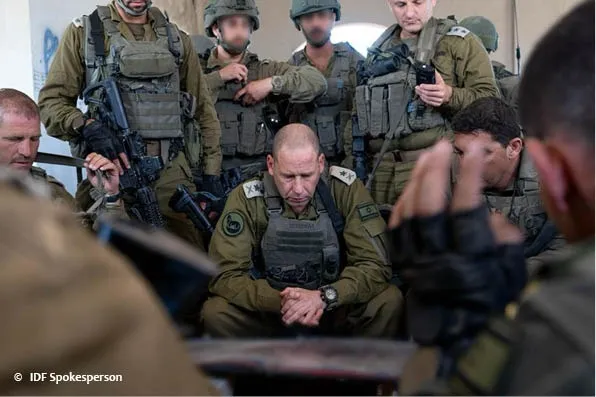
The commander of Southern Command conducting a situation assessment in the Gaza Strip – © IDF Spokesperson
Michael Oren: A Memorial Day Plea
Whether on the ground, or in the air, the Israeli people must unite
In the midst of a desperate war and on the eve of Memorial Day, a deep schism has opened within the IDF. According to press reports, the Israeli Air Force has complained that the Southern Command, in charge of ground operations in Gaza, has ordered bombing raids that supposedly endanger the hostages and result in too many civilian casualties. The Southern Command, while no less concerned about the survival of the hostages, denies that the raids are too damaging to civilians and reminds the Air Force that we are fighting against an enemy who uses those civilians as human shields. Any “collateral damage,” as it’s called euphemistically, is caused by Hamas, not the IDF.
The debate reflects fundamental differences between the air force and the ground forces. Pilots fire from tens of thousands of feet in the air, far from almost any danger, while the ground troops are fighting in the ruins and mud of Gaza with indescribable dangers everywhere. But while seemingly about operational issues, the debate reflects the underlying divisions within Israeli society. The majority of the pilots come from a different socio-economic background than most of the Golani soldiers and paratroopers under the Southern Command. There are ethnic and religious schisms that separate the two groups as well. At stake is not only the differences between the blue uniforms of the air force and the ground forces’ green uniforms, but between people of Israel generally.
As such, the debate within the IDF is similar to that over judicial reform that preceded the war. While protests broke out in the more affluent areas of the country with demonstrators accusing the government of plotting to make a dictatorship, in other, less privileged areas, the anti-reform movement was seen as a last-ditch effort by a secular elite to preserve the power they lost at the polls by rallying around the last bastion of that power, the Supreme Court. Both sides accused the other of destroying democracy. Significant numbers of pilots threatened to protest the reform by not reporting for reserve duty. Significant numbers of paratroopers and Golani veterans did not.
We know from captured Hamas documents that the divisions within Israeli society caused by the struggle over judicial reform convinced the terrorists that Israel was vulnerable and could easily be attacked. Similarly, in the debate over civilian casualties in Gaza, Hamas will detect yet another sign of Israel’s deteriorating unity, and fight with even greater ferocity. The United Nations and other international organizations will redouble their efforts to condemn Israel for war crimes. “Your own officers say you’re committing them,” UN officials will say, “so why can’t we?”
This is why, especially on the eve of Memorial Day, we must not repeat the past’s mistakes and work to resolve our differences quietly and behind closed doors. We must strive to achieve a compromise which, while not loved by all, will at least prove acceptable. Achieving that compromise is not just the job of the army but above all, the government’s, which must not retreat from its sovereign responsibility. We owe this all to the memory of the approximately 25,000 who fell in our wars and in terrorist attacks. We must honor them all with unity.
This article originally appeared in Hebrew in Ynet on April 28, 2025








